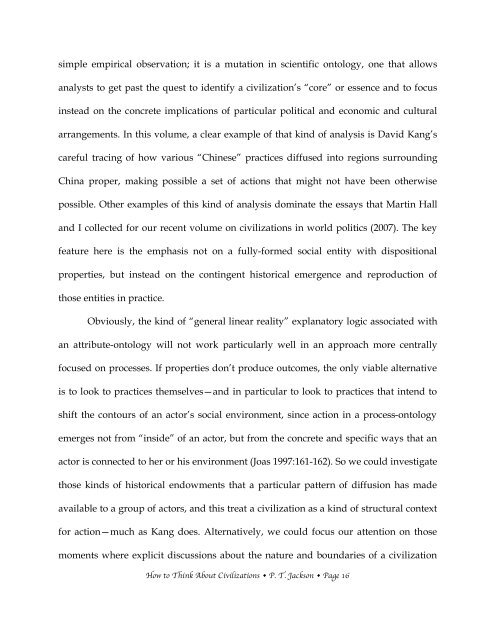How to Think About Civilizations - The Watson Institute for ...
How to Think About Civilizations - The Watson Institute for ...
How to Think About Civilizations - The Watson Institute for ...
Create successful ePaper yourself
Turn your PDF publications into a flip-book with our unique Google optimized e-Paper software.
simple empirical observation; it is a mutation in scientific on<strong>to</strong>logy, one that allows<br />
analysts <strong>to</strong> get past the quest <strong>to</strong> identify a civilization’s “core” or essence and <strong>to</strong> focus<br />
instead on the concrete implications of particular political and economic and cultural<br />
arrangements. In this volume, a clear example of that kind of analysis is David Kang’s<br />
careful tracing of how various “Chinese” practices diffused in<strong>to</strong> regions surrounding<br />
China proper, making possible a set of actions that might not have been otherwise<br />
possible. Other examples of this kind of analysis dominate the essays that Martin Hall<br />
and I collected <strong>for</strong> our recent volume on civilizations in world politics (2007). <strong>The</strong> key<br />
feature here is the emphasis not on a fully-<strong>for</strong>med social entity with dispositional<br />
properties, but instead on the contingent his<strong>to</strong>rical emergence and reproduction of<br />
those entities in practice.<br />
Obviously, the kind of “general linear reality” explana<strong>to</strong>ry logic associated with<br />
an attribute-on<strong>to</strong>logy will not work particularly well in an approach more centrally<br />
focused on processes. If properties don’t produce outcomes, the only viable alternative<br />
is <strong>to</strong> look <strong>to</strong> practices themselves—and in particular <strong>to</strong> look <strong>to</strong> practices that intend <strong>to</strong><br />
shift the con<strong>to</strong>urs of an ac<strong>to</strong>r’s social environment, since action in a process-on<strong>to</strong>logy<br />
emerges not from “inside” of an ac<strong>to</strong>r, but from the concrete and specific ways that an<br />
ac<strong>to</strong>r is connected <strong>to</strong> her or his environment (Joas 1997:161-162). So we could investigate<br />
those kinds of his<strong>to</strong>rical endowments that a particular pattern of diffusion has made<br />
available <strong>to</strong> a group of ac<strong>to</strong>rs, and this treat a civilization as a kind of structural context<br />
<strong>for</strong> action—much as Kang does. Alternatively, we could focus our attention on those<br />
moments where explicit discussions about the nature and boundaries of a civilization<br />
<strong>How</strong> <strong>to</strong> <strong>Think</strong> <strong>About</strong> <strong>Civilizations</strong> • P. T. Jackson • Page 16
















